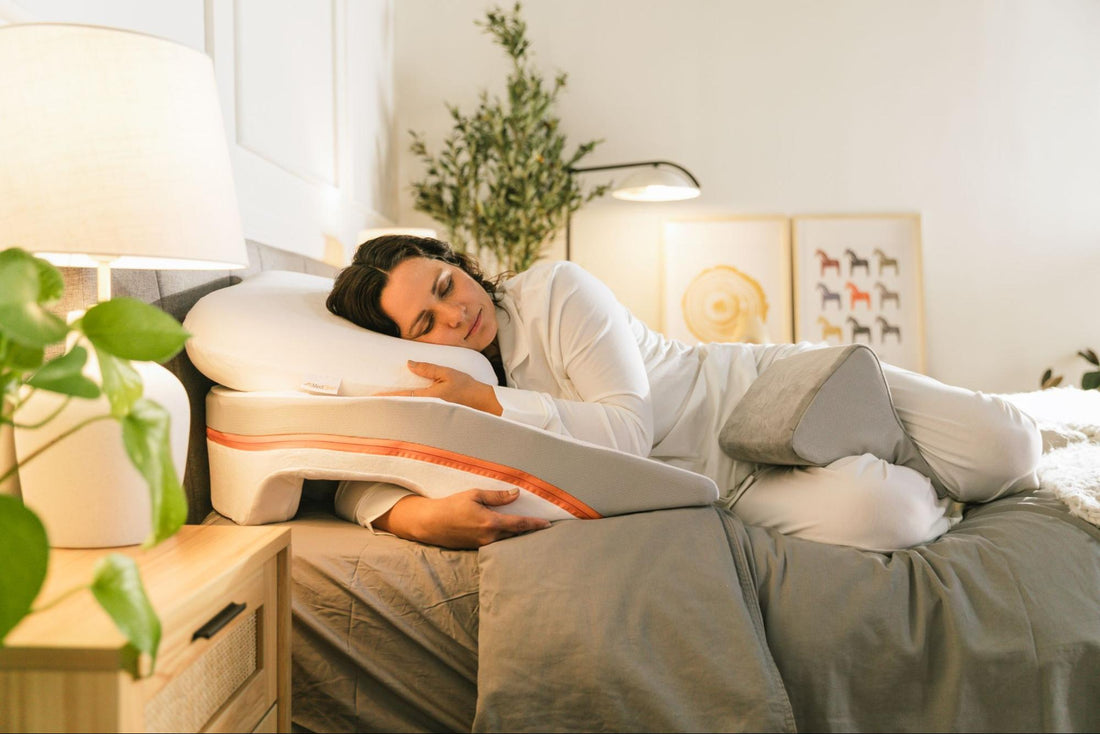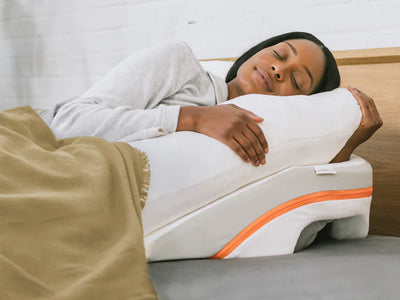
Related Product

Reflux Relief System
$249.99 USD
Say goodbye to nighttime Acid Reflux & GERD pain without sacrificing comfort.
Best Anti-Snoring Pillows: Your Guide to Quiet Sleep
Share
Snoring is a common sleep-related issue, affecting about 57% of men and 40% of women. It can disrupt sleep patterns and impact the sleep quality of the snorer and their sleep partner.

Anti-snoring pillows are becoming a more popular choice to help relieve the issue. But do they work?
In this comprehensive guide, we'll explore the science behind anti-snore pillows. We'll also discuss what to look out for when choosing a pillow to help with snoring. Let's dive in!
What are Anti-Snoring Pillows?
Anti-snore pillows go beyond regular pillows. They're specifically designed to keep you in a position that deters snoring. Common materials used in a pillow to reduce snoring include the following:

- Memory foam becomes malleable when warmed by body heat, molding around your head and neck. This contouring keeps your neck slightly curved, helping reduce your throat tissues from vibrating.
- Polyfoam is breathable, making it a good choice for snorers who run hot when they sleep. Just ensure the pillow features high-quality polyfoam. That way, it's less likely to create lasting indentions and keep your spine aligned.
- Latex offers dense material that's durable and supportive. It's also resistant to dust mites—ideal for sleepers with allergies.
- Feathers provide softness and moldability, making it easy for sleepers who toss and turn to find a comfortable position. But they're also more likely to hold onto allergens.
- Down feathers offer an even more plush feel and moldability. But they could also irritate a sleeper's allergy symptoms and worsen snoring.
How Do Anti-Snoring Pillows Work?
Snoring occurs when your airway becomes blocked. When you try to push air through your constricted passageways at night, it causes the soft tissues of your throat to vibrate. This vibration creates the sound of snoring.
Anti-snoring pillows elevate your head, neck, and shoulders so airways stay open while you sleep. These pillows also support proper spine alignment. Some even help keep you off your back. Research shows that a supine sleeping position can cause your tongue to fall back and block your airways.
Finding the best pillow to reduce snoring will depend on your preferences and sleep style. Here are a few of the most common types of pillows for preventing snoring.

- Wedge pillows are typically made of foam. They elevate the upper body and promote side sleeping. This helps prevent soft tissue from constricting the airways and causing snoring. Keeping your upper body propped up while you sleep also helps stop snoring in several other ways. For instance, elevating your body promotes sinus drainage, helping to clear any congestion. If you suffer from acid reflux, wedge pillows can keep the acid from rising in your esophagus.
- Body pillows also help you rest comfortably in a side-sleeping position. These anti-snore pillows feature a long, thick bolster-type shape to rest firmly against your spine. This propped support can keep you from rolling onto your back during sleep.
- Contoured pillows have a distinct shape that follows the natural curvature of the head and neck. They help maintain proper spine alignment and keep airways open. Some contoured pillows contain memory foam, latex, or other supportive materials. Some may also feature built-in elevation.
Effectiveness of Anti-Snoring Pillows
But do these pillows actually help with snoring? In short, yes. Science says they’re an effective snoring solution.
One study had participants use their regular pillows for one part of the research before switching them out with an anti-snoring pillow. At the end of the study, researchers found that snoring intensity was reduced by 51% when using the anti-snore pillow.
Another study followed participants between the ages of 18 and 78 who snored and had sleep partners. Two phases of the study were done at the snorers' homes, while two phases were done in a sleep lab. At the study’s end, the polysomnography results and the snorers’ sleep partners reported decreased snoring severity.
Snoring, paired with breathing pauses, is often associated with obstructive sleep apnea (OSA). Decades of research show that positional therapy can help significantly reduce OSA symptoms. Continuous airway pressure (CPAP) remains the gold standard for OSA. But, some studies report patients may tolerate positional therapy better.
A Buyer’s Guide to Anti-Snoring Pillows
When choosing a pillow for snoring, there are a few other considerations besides material and shape (which we’ve listed above). Here are a few other things to look for in an anti-snoring pillow.
- Loft - The thickness of your loft will depend on your body type and preferred sleep position. While many sleepers will do well with a medium-fill loft, others will need less or more. For example, if you have broad shoulders, you'll need a thicker loft for adequate head and neck support.
- Support - An anti-snoring pillow should properly support spinal alignment. If the pillow is too flat, it can cause your neck to bend and constrict your airway. Conversely, too much support can bend your neck back and place pressure on your throat's soft tissue.
- Firmness - Your sleep preferences and individual needs will impact the firmness levels of your pillow. For instance, sleepers who weigh more might need a firmer pillow for better support and neck alignment. Side sleepers will also need a firmer anti-snore pillow than those who sleep on their stomach.
- Price - It may be tempting to buy a cheap pillow to save money. But it's worth considering the price per value of the anti-snore pillow. While more high-end pillows will be more expensive, they'll likely need less replacing, saving you money in the long run.
- Comfort - While pillows that offer pressure relief and temperature regulation won't necessarily impact your snoring, they will affect your comfort levels. Advanced pillows like MedCline's Sleep Solutions can help you address poor sleep patterns and snoring while providing an enjoyable sleeping experience. Our medically proven sleep wedges feature a patented arm pocket that keeps you comfortably on your side while alleviating pressure on your shoulders. Our breathable materials include adjustable memory foam stuffing, letting you modify your pillow to suit your preferences for a better night’s sleep.
Additional Tips for Reducing Snoring
Along with anti-snoring pillows, you can make other lifestyle changes to find natural relief from snoring without medication.

For instance, eating a nutritious diet and maintaining a healthy weight can help prevent or reduce your snoring. When you have excess weight around your neck and midsection, it can block your upper airways when lying down. Regularly exercising has also been shown to reduce OSA symptoms, like snoring.
Establishing good sleep hygiene, like setting a regular sleep-wake schedule, can also help support your circadian rhythm for a deeper, less disruptive sleep. Other healthy sleep habits include swapping out your screens for a calming activity like reading at least an hour before bed.
Addressing the underlying causes of snoring requires a comprehensive approach. Before trying any new remedies, consult a healthcare professional to help you determine the most suitable treatment plan for your individual needs.
Find Relief with MedCline’s Anti-Snoring Solutions
If you suffer from snoring, using an anti-snore pillow is an effective way to find relief and experience the quality sleep you deserve.
At MedCline, we’re invested in helping you find a solution for your snoring. Our snoring pillows are backed by science and offer safe, non-medication solutions. Made with adjustable memory foam stuffing, our seamless design features full body support to align your spine and elevate your upper body, keeping your airways open.
For more information about how our snoring solutions can help with childhood snoring, head to our MedCline FAQs or reach out to our team of Sleep Specialists today!

Resources
Rubin, Michael. Overview of Spinal Cord Disorders. Merck Manual, Feb. 2023, www.merckmanuals.com/professional/neurologic-disorders/spinal-cord-disorders/acute-transverse-myelitis.
Robin, I. G. (1948). Snoring. Proceedings of the Royal Society of Medicine, 41(3), 151-153. https://www.ncbi.nlm.nih.gov/pmc/articles/PMC2184387/
Albares, J., Esteller, E., Estivill, C., Martinez, C., Segarra, F., & Estivill, E. (2013). Validation of the efficacy of an anti-snoring pillow. Sleep Medicine, 14, e57-e58. https://doi.org/10.1016/j.sleep.2013.11.103
Cazan, D., Mehrmann, U., Wenzel, A. et al. (2017). The Effect on Fnoring of Using a Pillow to Change the Head Position. Sleep Breath, 21, 615–621. https://doi.org/10.1007/s11325-017-1461-1
- Ravesloot, M. J., & Dun, L. (2013). The Undervalued Potential of Positional Therapy in Position-Dependent Snoring and Obstructive Sleep Apnea—A Review of the Literature. Sleep & Breathing = Schlaf & Atmung, 17(1), 39-49. https://doi.org/10.1007/s11325-012-0683-5
Clebak, Karl T. Positional Therapy for Obstructive Sleep Apnea. American Academy of Family Physicians, 2020, 101(1):16-17. www.aafp.org/pubs/afp/issues/2020/0101/p16.html.
Iftikhar IH, Kline CE, Youngstedt SD. (2014). Effects of Exercise Training on Sleep apnea: A Meta-Analysis. 192(1):175-84. doi: 10.1007/s00408-013-9511-3
Related Product

Reflux Relief System
$249.99 USD
Say goodbye to nighttime Acid Reflux & GERD pain without sacrificing comfort.

